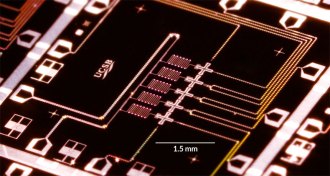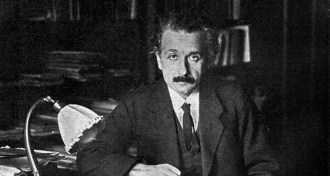Quantum Physics
-
 Quantum Physics
Quantum PhysicsMajor step taken toward error-free computing
Physicists have achieved nearly perfect control over a bit of quantum information, bringing them a step closer to error-free computation.
-
 Quantum Physics
Quantum PhysicsShor’s code-breaking algorithm inspired reflections on quantum information
Twenty years ago, physicists met in Santa Fe to explore the ramifications of quantum information.
-
 Quantum Physics
Quantum PhysicsExcitons’ motions captured in images
Scientists have observed how quasiparticles called excitons move.
-
 Quantum Physics
Quantum PhysicsQuantum experts discuss the measurement problem: A transcript from 1994
A fairly complete transcript of a discussion about quantum physics on May 19, 1994, the last day of a workshop in Santa Fe, N.M., evolves into a more general discussion of the interpretation of quantum mechanics and the quantum measurement problem.
-
 Quantum Physics
Quantum PhysicsRobert Redford film foretold Shor’s quantum computing bombshell
Twenty years ago, Peter Shor showed how quantum computers could break secret codes, turning the movie Sneakers from fiction to fact.
-
 Quantum Physics
Quantum PhysicsSmall step taken for quantum communication
A single atom can change the state of a photon, which may help build quantum networks.
-
 Quantum Physics
Quantum PhysicsU.S. marches to tick of new clock
The atomic clock NIST-F2 has launched as the country’s official civilian time and frequency standard.
-
 Quantum Physics
Quantum PhysicsFinding a quantum way to make free will possible
Maybe quantum influences from the Big Bang make humans unpredictable, permitting the possibility of free will.
-
 Quantum Physics
Quantum PhysicsQuantum timekeeping
Recent advances in controlling the quantum behavior of particles have inspired physicists to dream of a global clock that would tell the same time everywhere. It would be hundreds of times as accurate as current atomic clocks.
By Andrew Grant -
 Quantum Physics
Quantum PhysicsEinstein was wrong about spooky quantum entanglement
Einstein’s biggest blunder wasn’t about vacuum energy in space, but in confusing people about quantum entanglement.
-
 Quantum Physics
Quantum PhysicsHistory affects superfluid’s flow, study shows
The speed to stop the stirring motion can be slower than what was need to set the fluid spinning in the first place, which shows that what happens to the current state of the superatom depends on what it has already experienced.
-
 Quantum Physics
Quantum PhysicsTom’s Top 10 interpretations of quantum mechanics
Quantum mechanics has given birth to dozens of interpretations, which themselves need interpretations.